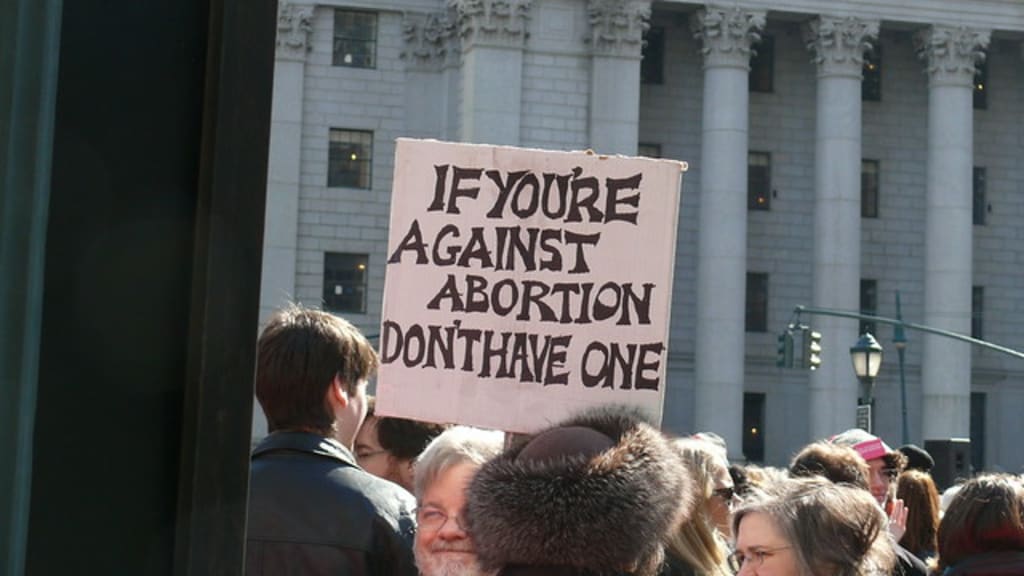All About Abortion
The Facts, the Myths, and the Women Who Get Them

Abortion will always be a controversial topic.
But what is abortion, really? There is a substantial amount of misinformation out there. It's easy to access the facts, but even easier to access false ones.
I'm pro-choice, and I've done my research. I've read about the different types of abortion, looked into when the fetus is capable of feeling pain, and talked to women who have had abortions (and don't regret it).
These are the facts.
WHAT IS ABORTION?
Abortion is defined as, "the removal of an embryo or fetus from the uterus in order to end a pregnancy." It can refer to the intentional termination of the pregnancy, as well as the removal of the embryo or fetus as a result of miscarriage.
TYPES OF ABORTIONS
Depending on which stage the pregnancy is in, there are several types of abortion. When scheduling a procedure, women will work with a healthcare professional to get more information and determine which procedure is best for them.
Medication
This abortion involves two pills: one to terminate the pregnancy, and another to cause bleeding, which will flush the fetus from the body. This abortion is often done in the early stages of pregnancy, and is done at home.
Vacuum Aspiration
Vacuum aspiration (AKA suction abortion) is an in-clinic abortion. It often takes place in the first 10-13 weeks of pregnancy, and involves using a tube to clear the contents of the uterus.
Dilation and Evacuation
Dilation and evacuation is another type of in-clinic abortion. It is similar to a vacuum aspiration, although the doctor will also use a tool to scrape out the uterus. It is most common during the second trimester.
Dilation and Extraction
Dilation and extraction is a type of in-clinic abortion that is used in the third trimester, or when there are complications that result in miscarriage and the removal of the fetus is deemed necessary. This kind of abortion is similar to both vacuum aspiration and dilation and evacuation, but often involves removing the fetus intact.
COMMON MYTHS ABOUT ABORTION: Women use abortion as birth control.
This is untrue—contraceptives are easier to get and more affordable than abortions.
Think about it. You can walk into a gas station and buy condoms right then and there, but you can't just walk into a clinic and get a same-day abortion. A 12-pack of Trojans is less than $5 at Walmart; an abortion can cost up to $950. If you have insurance, hormonal contraceptives—like the pill, IUD, and implant—are often covered. Without insurance, those are still more affordable than an abortion.
Pregnancy affects a woman's body, so it's unlikely that she would risk it and get an abortion when she could easily use something else to prevent it.
Women who get abortions will regret it.
Women get abortions for a number of reasons.
Some women aren't ready (whether financially, emotionally, or physically) to carry a baby to term and care for it. Some women may not want to carry to term if the pregnancy is the result of rape and/or incest—and for young victims, it may be both physically and emotionally traumatizing to carry to term. Other women may want a baby, but need a medically-necessary abortion. Without it, they could lose their lives.
Whatever the reason, it is an extremely personal choice. Women who choose abortion are choosing it for a reason, and they are unlikely to regret that choice if it positively benefits their life.
Fetuses experience pain during the procedure.
A fetus is incapable of experiencing pain until the third trimester. The American College of Obstetricians and Gynecologists (ACOG) has done studies that show a fetus is unable of perceiving pain 'til at least 24 weeks into the pregnancy. ACOG maintains that the fetus cannot feel pain until its brain has developed the connections to do so, so it "does not have the physiological capacity to perceive pain" during abortions before the third trimester. Even then, just because it has the ability to physically feel pain, the fetus doesn't have the cognitive functions to understand what pain is. The pro-life side paints a pretty violent depiction of abortions during the third trimester, but it just isn't accurate.
Speaking of abortions during the third trimester...
Women can get late-term abortions "just because."
By the third trimester, you have committed to the pregnancy. Your body has been physically altered over the last several months. Women don't get late-term abortions because they've decided they don't want to have a baby.
When women have late-term abortions, it's because something went wrong. Maybe they miscarried or have suffered a complication that could cause septic shock, stroke, or extensive blood loss. Maybe the baby will die during childbirth. Maybe the woman will die during childbirth. Whatever it is, late-term abortions are for women whose pregnancy will cause serious risks to their health, or could be fatal.
The misconception that women would—and can—get late-term abortions simply because they want to is dangerous to women who need late-term abortions. Abortion in the third trimester occurs when it is medically necessary, and should be available to all women. Their lives have more value.
WOMEN ON ABORTION: THEIR STORIES
I spoke to three women about their abortions. Agreeing to be identified by their first initial, each woman opened up to me about their incredibly personal choice to have an abortion—whether due to medical necessity or the inability to raise a child.
How old are you?D: 19T: 27J: 19
Do you have children?D: Yes.T: Yes.J: No.
How old were you at the time of your abortion?D: 18T: 21J: 18
Was it an unplanned pregnancy?D: Yes.T: Yes.J: Yes.
What was your reason for abortion?D: Inability to care for/afford a child.T: Medically necessary.J: Inability to afford a child.
What trimester were you in?D: First.T: First.J: First.
Where did you go for the procedure?D: Planned Parenthood.T: Local hospital.J: Planned Parenthood.
What kind of abortion was performed?D: Surgical; vacuum aspiration.T: Surgical; dilation and extraction.J: Medication.
Tell me about your experience.D: I found myself pregnant just a few months after giving birth to my daughter, and if I didn’t have my abortion, I don’t think I would be where I am in my life. I’m financially stable and have a close relationship with my daughter. Given my circumstances, it was the right choice for me.T: I found out I was pregnant in a freshly-new relationship. We both always wanted a family, just [weren't] expecting it so soon. But we were ready and went to our second doctor's appointment. When she told us she couldn't find a heartbeat, we were devastated. I had to have a [dilation and extraction] and woke up bawling... but it was necessary. J: I was 18 when I found out I was pregnant. I had just graduated high school and was getting ready for college. I didn't find out I was pregnant until week 8.5 because I had no symptoms. I was on the pill, which had been messing with my periods already, so I thought nothing of a missed period. I wanted the baby, but I knew the cons outweighed the pros. I was financially incompetent to raise a child and would have derailed my education. So... I put my future first and decided aborting the pregnancy was the best decision for me. I wouldn't change my decision.
Do you think abortion should be legal everywhere?D: Yes.T: Yes.J: Yes.
Do you think abortion should be legal in all circumstances?D: Yes.T: Yes.J: Yes.
What would you tell other women considering abortion?D: It's your choice!T: You do what you think you should and is best for you.J: There isn't a right or wrong decision. Do what's best for you and your life, because at the end of the day, no one's opinion but yours matters.
LONG STORY SHORT: WOMEN DESERVE THE RIGHT TO CHOOSE
Laws that make abortion illegal are extremely dangerous for women. These laws place the potential life of developing cells over the real lives of women; when abortion is illegal, women will miscarry and die, perform risky abortions at home (or in back-alley clinics), and carry their rapists' children.
Women deserve the right to choose, and they will always fight for that right.
About the Creator
Katherine J. Zumpano
writer 🖌️ reader 📖 pnw 🌲
wwu alum 🎓
pisces sun ♓️ taurus moon ♉️
pieces in southchild lit, jeopardy mag & more
social media: @kjzwrites






Comments
There are no comments for this story
Be the first to respond and start the conversation.